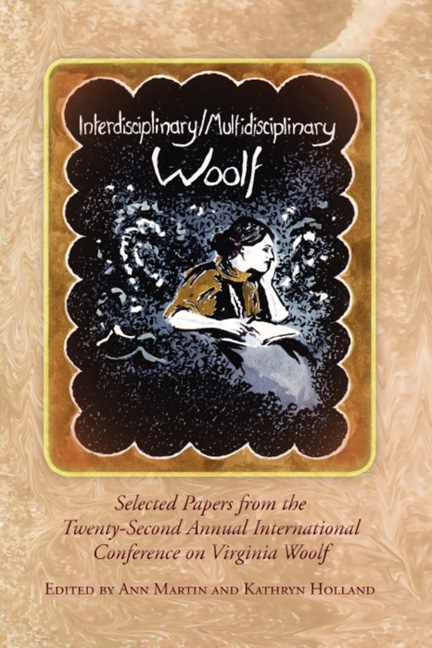Book contents
- Frontmatter
- Contents
- Introduction to Interdisciplinary/Multidisciplinary Woolf
- Acknowledgments
- List of Abbreviations
- History, Materiality, Multiplicity
- Patterns, Practices, Principles
- Art, Influence, Embodiment
- Publishing, Politics, Publics
- “The most unaccountable of machinery”: The Orlando Project produces a textbase of one's own
- The Hotel at the End of the Universe
- Globalization, Inter Connectivity, and Anti-Imperialism: Leonard Woolf, the Hogarth Press, and Kenya
- Chinese Eyes and Muddled Armenians: The Hogarth Press and British Racial Discourse
- “No One Wants Biography”: The Hogarth Press Classifies Orlando
- There Goes the Bride: Virginia Woolf, Julia Strachey, and the Hogarth Press
- Redefining Woolf for the 1990s: Producing and Promoting The “Definitive Collected Edition”
- The Believers: Writers Publishing for Readers, Or Preliminary Musings on The Hogarth Press and McSweeney's
- The Woolfs in Print and Online: A University Press in Transition
- Notes on Contributors
- Conference Program
Redefining Woolf for the 1990s: Producing and Promoting The “Definitive Collected Edition”
from Publishing, Politics, Publics
- Frontmatter
- Contents
- Introduction to Interdisciplinary/Multidisciplinary Woolf
- Acknowledgments
- List of Abbreviations
- History, Materiality, Multiplicity
- Patterns, Practices, Principles
- Art, Influence, Embodiment
- Publishing, Politics, Publics
- “The most unaccountable of machinery”: The Orlando Project produces a textbase of one's own
- The Hotel at the End of the Universe
- Globalization, Inter Connectivity, and Anti-Imperialism: Leonard Woolf, the Hogarth Press, and Kenya
- Chinese Eyes and Muddled Armenians: The Hogarth Press and British Racial Discourse
- “No One Wants Biography”: The Hogarth Press Classifies Orlando
- There Goes the Bride: Virginia Woolf, Julia Strachey, and the Hogarth Press
- Redefining Woolf for the 1990s: Producing and Promoting The “Definitive Collected Edition”
- The Believers: Writers Publishing for Readers, Or Preliminary Musings on The Hogarth Press and McSweeney's
- The Woolfs in Print and Online: A University Press in Transition
- Notes on Contributors
- Conference Program
Summary
It is 1988. Hair is big and denim acid-washed. Calgary is host to the Winter Olympics, Rainman is the Oscar's best picture, and Tracy Chapman is singing about a “Fast Car.” Stephen Hawking publishes A Brief History of Time, and Peter Carey's Oscar and Lucinda wins the Booker Prize. The MLA bibliography lists eight-two publications about Virginia Woolf: in scanning the list the three main interests of academics are psychoanalysis, sexuality, and feminism. Many of the scholars working on Woolf are located in the United States. Diane Gillespie's The Sisters’ Arts appears. The year 1988 is one of the key moments in marketing and publishing Woolf because of copyright, because of academic trends, and because of changes at the Hogarth Press itself.
I recently argued that there are three unexplored turning points of the Hogarth Press: the 1946 merger with Chatto and Windus, the change to a paperback imprint in 1984, and the re-launch of the Press in 1990. In exploring the economic, social, and cultural history of the Hogarth Press, I have traced threads of influence, modernist legacies that last far beyond the Second World War. Part of the changing impact of the Press can be found by tracing the content of the Hogarth Press brand as it was shaped across the decades of the twentieth century. The Hogarth Press has continuously affected, not only our views of authors like Virginia Woolf, of the Bloomsbury Group, and of modernism as a movement, but also some of the larger debates of the twentieth century: feminism and global capitalism. One place where many of these elements coalesce is in the production and promotion of the “Definitive Collected Edition” of Woolf's novels.
My argument for the importance of the turning point of the late 1980s is based on my recent discoveries in the Hogarth Press archive, the thick files detailing the years of planning for the edition right up to its design, production, and promotion. In these files we read about the editors’ debates regarding marketing strategy, their attempt to establish new copyrights for the novels, the proper pricing for the volumes and financial constraints of production, as well as their larger program of changing the public perception of Woolf, particularly in Britain.
- Type
- Chapter
- Information
- Interdisciplinary/Multidisciplinary Woolf , pp. 256 - 261Publisher: Liverpool University PressPrint publication year: 2013



